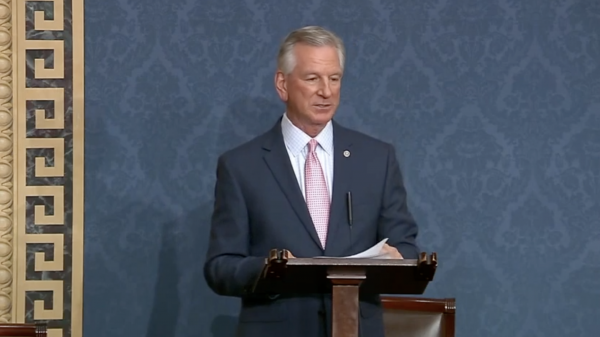By Chip Brownlee
The Alabama Political Reporter
MONTGOMERY—Thomas Arthur, a 74-year-old death row inmate who is scheduled for execution at Holman Correctional Facility in Atmore on Nov. 3, has requested the 11th Circuit Court of Appeals stay his execution pending a decision in his appeal case.
Arthur filed an appeal with the 11th Circuit arguing that the proposed drug regimen to be used in his scheduled execution in November violates the Eighth Amendment, which prohibits cruel and unusual punishment, and the 14th Amendment’s equal protection clause.
He and his attorneys have asked for an alternative form of execution be provided.
The Court recently ordered an expedited schedule to ensure his case can be ruled on before his execution. But last week his attorneys asked that the Court delay the execution in “an abundance of caution” to ensure that his case can be tried.
Precedent requires that the appellant show there is likelihood that their appeal could succeed on merit, that there will be irreparable injury if their stay is not allowed, that others won’t be harmed if the stay is granted and that granting the stay would serve the public.
Arthur argued that he has met all of the requirements for his stay to be granted.
“Mr. Arthur has identified several critical errors in the district court’s adjudication of his claims, creating a substantial likelihood that he will prevail on appeal,” his attorneys wrote. His attorneys have argued his appeal before the United States District Court for the Middle District of Alabama was erroneously struck down.
In the past, Arthur suggested to the Federal District Court a firing squad or another lethal execution drug as alternatives. But the Federal District Judge J. Fuller, who heard the case in 2011 and dismissed it because he said Arthur had not identified a source for the alternative drug regimen and a firing squad isn’t named as a form of execution in Alabama laws.
Arthur was not afforded the opportunity for discovery or a bench trial.
In his brief to the 11th Circuit Court of Appeals, Arthur argued that Midazolam “isn’t up to the task” of anesthetizing a person facing “invasive surgery,” much less “painful executions.”
In 2015 After a near two-year lull in executions, Christopher Brooks became the first inmate executed using the State’s new three-drug regimen, which includes the use of Midazolam as a sedative before two other life-taking drugs are induced.
Midazolam is a sedative, used most often in preoperative care to prepare patients for the induction of general anesthesia and to sedate those on ventilators.
Arthur argued in his brief that Pentobarbital — a strong anesthetic used for general anesthesia in more invasive procedures — would be a better alternative to the weaker Midazolam.
But the State has had difficulty in obtaining both Pentobarbital and Midazolam.
The effectiveness of Midazolam has been hotly debated, culminating in a US Supreme Court decision last year, which upheld the use of the drug in a 5-4 decision. However, the cocktail would likely induce a painful heart attack because Arthur suffers from old age and a preexisting cardiac condition, his attorney have argued.
They say his health conditions make his case different from previous cases.
Arthur’s counsel refused to provide the alternative method requested by the Court, instead submitting a brief by Harvard medical professionals that said medical professionals would be the best experts to give advice on alternatives, but in doing so they would violate medical ethics.
The Alabama Supreme Court set Arthur’s execution date on six prior occasions, and the State argues that November is the appropriate time for his execution.
“As for the six previous settings, Arthur has manipulated the State and federal court systems to escape the imposition of justice, even going so far as to use perjured testimony to seek a reprieve,” the Alabama Attorney General’s office argued. “Even today, Arthur seeks to further hamper the State’s ability to carry out his execution by arguing in favor of two alternative methods of execution—Pentobarbital and Midazolam lethal injection—that he previously opposed, in toto, in filings with the district court and in correspondence with Appellees.”
Arthur’s attorney said a stay would not injure the State or be adverse the public interest.
“The State has no interest in executing Mr. Arthur in violation of the Constitution, which would occur here if a stay is not entered,” his attorney said. “Similarly, the public interest ‘has never been and could never be served by rushing to judgment at the expense of a condemned inmate’s constitutional rights.'”
A jury convicted Arthur and sentenced him to the death penalty more than 30 years ago for the murder-for-hire of Troy Wicker, a Muscle Shoals businessman. He has maintained his innocence.
In 2008, another convict, Bobby Ray Gilbert, came forward and confessed to the same murder, but a judge in 2009 ruled Gilbert lied after DNA evidence failed to link him to the crime scene.
A court later refused to allow Arthur, who was convicted and moved to death row in 1983, his own DNA to prove his innocence. According to previous Supreme Court rulings, the right to DNA testing to prove innocence doesn’t exist.
In January, Brooks, a 43-year-old convicted murderer and rapist, became the most recent inmate executed in Alabama after a two-year hiatus in executions that began in 2013 thanks to the rising scarcity of Midazolam and court litigation.
Brooks was the first inmate in Alabama to be sedated with 500 milligrams of Midazolam and executed with two other drugs in the new three-drug regimen, which is the same regimen the State has proposed to use for Arthur’s execution scheduled for November.
“It went exactly as I expected it to,” Alabama Prisons Commissioner Jeff Dunn said after the January execution.















































